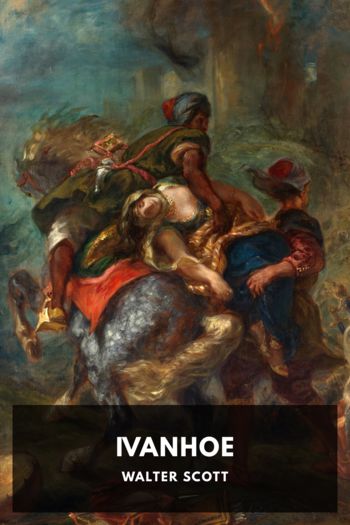Ivanhoe - Walter Scott (bookreader txt) 📗

- Author: Walter Scott
Book online «Ivanhoe - Walter Scott (bookreader txt) 📗». Author Walter Scott
I’ll tell thee what, my friend,
He is a very serpent in my way;
And wheresoe’er this foot of mine doth tread,
He lies before me.—Dost thou understand me?
There was brave feasting in the Castle of York, to which Prince John had invited those nobles, prelates, and leaders, by whose assistance he hoped to carry through his ambitious projects upon his brother’s throne. Waldemar Fitzurse, his able and politic agent, was at secret work among them, tempering all to that pitch of courage which was necessary in making an open declaration of their purpose. But their enterprise was delayed by the absence of more than one main limb of the confederacy. The stubborn and daring, though brutal courage of Front-de-Boeuf; the buoyant spirits and bold bearing of De Bracy; the sagacity, martial experience, and renowned valour of Brian de Bois-Guilbert, were important to the success of their conspiracy; and, while cursing in secret their unnecessary and unmeaning absence, neither John nor his adviser dared to proceed without them. Isaac the Jew also seemed to have vanished, and with him the hope of certain sums of money, making up the subsidy for which Prince John had contracted with that Israelite and his brethren. This deficiency was likely to prove perilous in an emergency so critical.
It was on the morning after the fall of Torquilstone, that a confused report began to spread abroad in the city of York, that De Bracy and Bois-Guilbert, with their confederate Front-de-Boeuf, had been taken or slain. Waldemar brought the rumour to Prince John, announcing, that he feared its truth the more that they had set out with a small attendance, for the purpose of committing an assault on the Saxon Cedric and his attendants. At another time the Prince would have treated this deed of violence as a good jest; but now, that it interfered with and impeded his own plans, he exclaimed against the perpetrators, and spoke of the broken laws, and the infringement of public order and of private property, in a tone which might have become King Alfred.
“The unprincipled marauders,” he said—“were I ever to become monarch of England, I would hang such transgressors over the drawbridges of their own castles.”
“But to become monarch of England,” said his Ahithophel coolly, “it is necessary not only that your Grace should endure the transgressions of these unprincipled marauders, but that you should afford them your protection, notwithstanding your laudable zeal for the laws they are in the habit of infringing. We shall be finely helped, if the churl Saxons should have realized your Grace’s vision, of converting feudal drawbridges into gibbets; and yonder bold-spirited Cedric seemeth one to whom such an imagination might occur. Your Grace is well aware, it will be dangerous to stir without Front-de-Boeuf, De Bracy, and the Templar; and yet we have gone too far to recede with safety.”
Prince John struck his forehead with impatience, and then began to stride up and down the apartment.
“The villains,” he said, “the base treacherous villains, to desert me at this pinch!”
“Nay, say rather the feather-pated giddy madmen,” said Waldemar, “who must be toying with follies when such business was in hand.”
“What is to be done?” said the Prince, stopping short before Waldemar.
“I know nothing which can be done,” answered his counsellor, “save that which I have already taken order for.—I came not to bewail this evil chance with your Grace, until I had done my best to remedy it.”
“Thou art ever my better angel, Waldemar,” said the Prince; “and when I have such a chancellor to advise withal, the reign of John will be renowned in our annals.—What hast thou commanded?”
“I have ordered Louis Winkelbrand, De Bracy’s lieutenant, to cause his trumpet sound to horse, and to display his banner, and to set presently forth towards the castle of Front-de-Boeuf, to do what yet may be done for the succour of our friends.”
Prince John’s face flushed with the pride of a spoilt child, who has undergone what it conceives to be an insult. “By the face of God!” he said, “Waldemar Fitzurse, much hast thou taken upon thee! and over malapert thou wert to cause trumpet to blow, or banner to be raised, in a town where ourselves were in presence, without our express command.”
“I crave your Grace’s pardon,” said Fitzurse, internally cursing the idle vanity of his patron; “but when time pressed, and even the loss of minutes might be fatal, I judged it best to take this much burden upon me, in a matter of such importance to your Grace’s interest.”
“Thou art pardoned, Fitzurse,” said the prince, gravely; “thy purpose hath atoned for thy hasty rashness.—But whom have we here?—De Bracy himself, by the rood!—and in strange guise doth he come before us.”
It was indeed De Bracy—“bloody with spurring, fiery red with speed.” His armour bore all the marks of the late obstinate fray, being broken, defaced, and stained with blood in many places, and covered with clay and dust from the crest to the spur. Undoing his helmet, he placed it on the table, and stood a moment as if to collect himself before he told his news.
“De Bracy,” said Prince John, “what means this?—Speak, I charge thee!—Are the Saxons in rebellion?”
“Speak, De Bracy,” said Fitzurse, almost in the same moment with his master, “thou wert wont to be a man—Where is the Templar?—where Front-de-Boeuf?”
“The Templar is fled,” said De Bracy; “Front-de-Boeuf you will never see more. He has found a red grave among the blazing rafters of his own castle and I alone am escaped to tell you.”
“Cold news,” said Waldemar, “to us, though you speak of fire and conflagration.”
“The worst news is





Comments (0)